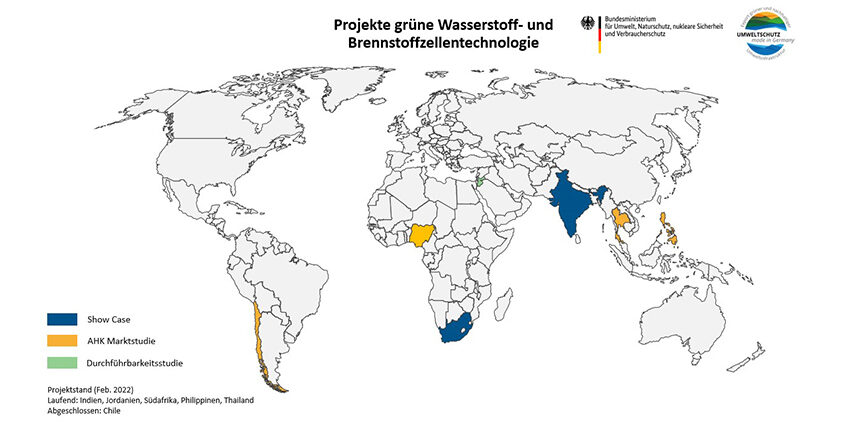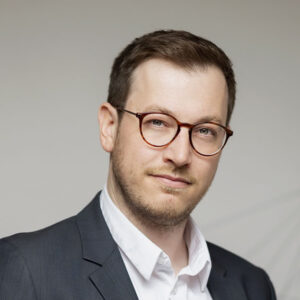The Export Initiative Environment Technologies (EXI – Exportinitiative Umwelttechnologien) looks back on a successful year in the field of green hydrogen and fuel cell technology.
With the start of NOW GmbH’s activities as part of the BMUV’s Export Initiative Environmental Technologies (EXI) marking roughly one year, a positive interim assessment can be made of what has been implemented so far. Green hydrogen is a central building block for achieving sustainability and climate goals, not only in Germany but also globally. The wide range of applications for hydrogen and fuel cell systems (H2 & FC systems) offers far-reaching possibilities for local value creation, including, for example, off-grid applications such as the replacement of diesel generators. As part of the EXI funding programme, NOW GmbH was commissioned by the Federal Ministry for the Environment, Nature Conservation, Nuclear Safety and Consumer Protection (BMUV – Bundesministerium für Umwelt, Naturschutz, nukleare Sicherheit und Verbraucherschutz) to make these and other possible areas of application visible to potential users worldwide with various lighthouse projects. In this way, market opportunities are also to be opened up for developers and innovative technology providers. The projects address concrete local needs in order to take the initial steps towards sustainable development, to create access to environmental technologies and to network the stakeholders. For the combined total of all H2-relevant activities, the Federal Ministry for the Environment, Nature Conservation and Nuclear Safety (BMUV) made 907,000 euros available in 2021 for the realisation of these projects.
First pilot projects launched in several countries
With the “German-Jordan Water-Hydrogen-Dialogue” (GJWHD), the South African “Hydrogen Tryout Area” (HyTrA) project as well as the “ECOFCGen – Decentralised Fuel Cell-based Power Generator” in India, the first EXI projects in the field of green hydrogen and fuel cell technology were recently launched:
Jordan: The GJWHD project facilitates the development and transfer of German/Jordanian knowledge in the fields of water, waste water and green hydrogen, and is implemented by the Wuppertal Institute (WI). The project aims to support sun and wind-rich countries with scarce water resources to sustainably use locally produced hydrogen for the domestic market. In this context, the bilateral development of knowledge between players in the German (waste) water sector and relevant Jordanian stakeholders is of great importance, as is the development of knowledge on the interrelationships between water as a resource and the sustainable production of green hydrogen.
South Africa: The HyTrA project of Fraunhofer IWU and Texulting GmbH from Saxony aims to tap into previously unexploited potential for local value creation in rural, remote and inaccessible areas in developing and emerging countries with so-called island networks or microgrids. Here, hydrogen could be produced decentrally from renewable energy and used for stationary reconversion into electricity by means of fuel cells. The necessary GreenTech products from Germany will contribute to the construction of a Hydrogen Tryout Area (HyTrA) for microgrids in South Africa. The project is complemented by a training and further education module for local experts.
India: In addition to developing a circular economy strategy for maintenance and service, the aim of the ECO-FCGEN project is to establish a competence hub for decentralised power supply using fuel cells in India. Synergies are to be achieved, such as the linking of renewable energies (RE) with the generation and storage of green hydrogen up to the demand-oriented, precise, decentralised and self-sufficient provision of energy by means of fuel cell gensets. The project is being conducted by CBC GmbH & Co. KG, Fraunhofer IPA and the University of Bayreuth.
German-Japanese cooperation provides the basis
These project approaches build on the experience gained in German-Japanese cooperation. Here, the possibilities of a system-supporting use of power-to-gas have been addressed since 2016 within the scope of the cooperation between NEDO and NOW. Most recently, in December 2021, the third expert workshop for users was able to identify potential options for business models and the implementation of cross-sectoral projects.
Four projects of the Chambers of Commerce Abroad are already in operation
In addition, four further projects are being implemented in cooperation with the Chambers of Commerce Abroad (AHK – Auslandshandelskammern): in Chile (already completed), in the Philippines (ongoing), in Thailand (ongoing) and Nigeria (Delegation of German Business, ongoing). The political, technical and economic framework conditions for different areas of application are being analysed there on site: for microgrids in rural areas in Nigeria, for the supply of electricity in the hotel and hospitality industry on Thai islands, or as a supplement to photovoltaic systems in the form of grid backup systems for the supply of electricity to industry and commerce in the Philippines. The German Chamber of Commerce Abroad in Chile has already prepared a potential analysis in cooperation with the Reiner Lemoine Institute and Chilean partners from business and politics. Discussions are currently taking place with the Chilean Ministry of Energy on how the cooperation that has been initiated can be continued with the involvement of German technology suppliers.
The studies offer valuable analyses of the local framework conditions as well as in relation to market potentials and thus lay the groundwork for future cooperation projects of German companies and research institutions via the local centres of competence.
These specific analyses and approaches to implementation projects complement the other foreign trade programmes, especially the Export Initiative Energy. In this context, the reciprocal provision of information ensures the greatest possible funding support contributions.
Cooperation with DIHK Service GmbH: GreenTech Agents
On behalf of the Federal Ministry for the Environment, Nature Conservation, Nuclear Safety and Consumer Protection (BMUV), the DIHK (Association of German Chambers of Industry and Commerce) and NOW cooperated in order to strengthen the transfer of knowledge of their joint work. For example, DIHK Service GmbH has developed an online course within the scope of EXI that trains the staff of the Chambers of Commerce to become so-called “GreenTech Agents”: Relevant, practical and engaging user know-how in the fields of the circular economy, green hydrogen and water management is imparted through interactive modules. NOW GmbH assisted with designing the content of the “green hydrogen” module. The modules include presentations, videos, infographics and practical exercises on specific market knowledge.
NOW GmbH will continue its work as a programme partner for the Export Initiative Environmental Technologies, which was successfully launched in 2021, together with the other programme companies. This will allow new projects to be submitted on an ongoing basis within the broad spectrum of applications for green hydrogen and fuel cell technologies. The NOW GmbH team is always on hand in this connection and is pleased to discuss project ideas at an early stage.
About EXI
The Federal Ministry for the Environment, Nature Conservation, Nuclear Safety and Consumer Protection (BMUV) launched the Export Initiative Environmental Technologies (EXI – Exportinitiative Umwelttechnologien) in 2016. The associated guideline for the promotion of measures in the field of the export of green and sustainable (environmental) infrastructure is intended to facilitate the international exchange and accessibility of knowledge and the application of innovative climate protection technologies and their infrastructure. Furthermore, to achieve concrete and sustainable development, suitable capacities and supply chains are to be established locally, appropriate framework conditions are to be created and cross-project knowledge is to be gained and developed. Since 2021, projects in the field of “green hydrogen and fuel cell technologies” for off-grid and decentralised power supply can be explicitly funded via the guideline.
The funding is particularly aimed at German technology companies – but also at project developers in the field of hydrogen and fuel cell technology seeking to establish themselves on an international level and create sales markets worldwide – as well as research institutions based in Germany that implement the scientific design and monitoring of a project. The focus of this work is on providing and embedding systems in local framework conditions that enable the environmentally friendly, off-grid or decentralised supply of electricity.
Image: Project overview of current green hydrogen and fuel cell technologies within the Export Initiative Environmental Technologies. © NOW GmbH


